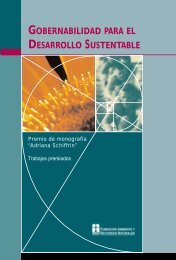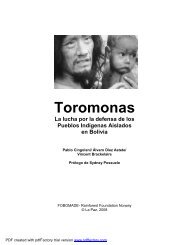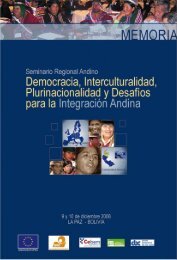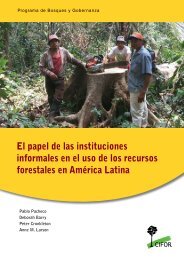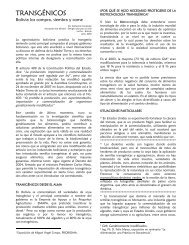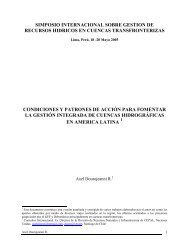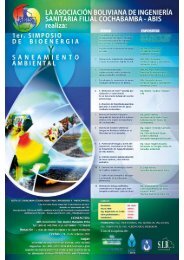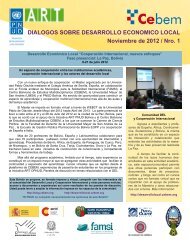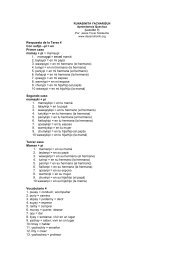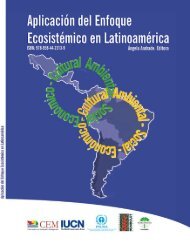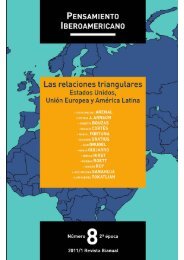Create successful ePaper yourself
Turn your PDF publications into a flip-book with our unique Google optimized e-Paper software.
Excerpts from a Report of the Durban Study Tour and the Planning Africa ConferenceThe study tour was very useful in providing learning experiences on all the projects visited which providedexposure on different approaches of housing delivery, and other community projects visited by thestudy team.The high level of community involvement by both the Local and Central Government among otherplayers in regards to project design, implementation and management impressed the study team. Thiswas agreed to be a major reason for the successful implementation of various the projects. The teamobserved in their respective towns, community engagement might not have reached such levels. Thedelegates appreciated that, the success of all the projects visited, was a result of all stakeholders’participation. This was a key lesson since the three cities are preparing their CDS, whose preparationand implementation of the identified projects, calls for strong stakeholders involvement andcommitment.Among the salient useful aspects of the study was the Warwick Road Junction Project. Warwick, whichis a community run and managed market project represents a success story of a project, which hastransformed the lives of many poor residents of Durban. The project has also enhanced security notonly in the area but also the entire city. Prior to implementation of this project Warwick junction used tobe a no-go zone especially during the apartheid regime. The Sustainable Cities Programme (SCP) of<strong>UN</strong>-HABITAT and <strong>UN</strong>EP who provided technical support initiated the project, which is a winner of <strong>UN</strong>-HABITAT Best Practice award. The Municipality of Durban and the target community took the lead rolein mobilizing the community, sourcing for resources, design, implementation and management. Theproject adopted a city consultation model similar to City Development Strategy (CDS) approach. Therewas every commitment by Durban Metro Authority to support this project. The existing projectmanagement structure at both Local and Municipal Levels was impressive leading to integration ofWarwick informal market activities to the rest of the Durban economy. The team observed this projecthas transformed the “illegal to legal”.The team toured different housing sites/project with the delegates observing the importance of propoorhousing policy. The team appreciated the need to encourage, promote and provide buildingand management skills especially to women. The linking of private sector to finance community housingwas a vital experience. The involvement of NGO groups like the B.E.S.G. in supporting housing provisionvia providing training on building and management skills was agreed to be a good lesson.However, too often, some of the housing scheme like rental schemes were abused where thebeneficiaries in most case were not the poor target group with the well-off taking over. This may worknegatively to the success of the project. The team observed that similar projects in East Africa hadfailed to deliver the desired results.The Conference on Regenerating Africa through Planning was found to be a useful forum where theteam was able to link field experience with the various conference themes. It provided an opportunityto share new ideas with other delegates from other part of the continent. The team observed thatsome of the presentations, e.g., by the Manager of Ethekweni Municipality on city economicdevelopment, was found to be very interesting especially to the city managers. Other discussions, e.g.,the role the cities should play within the NEPAD initiative, strengthening the need for the three EastAfrican towns to play a more active role in promoting the ongoing regional cooperation through Lake<strong>Victoria</strong> Regional Local Authorities Cooperation (LVRLAC) and Lake <strong>Victoria</strong> Environmental ManagementProject (LVEMP). The delegates agreed that this would place their towns in a strategic position to benefitin the new NEPAD initiative.30Cities Development Strategies for Improved Urban Environment and Poverty Reduction in the Lake <strong>Victoria</strong> Region



